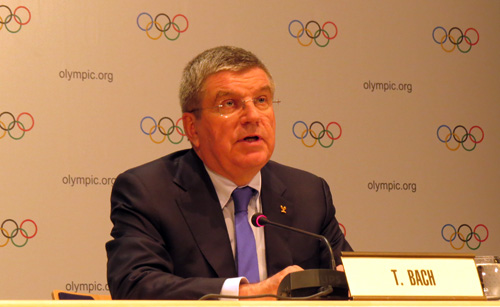Australian Olympic Committee (AOC) President John Coates this week failed to cool opposition by populist One Nation Party to a Queensland 2032 Olympic and Paralympic Games bid.

at the 135th IOC Session in Lausanne, Switzerland – January 10, 2020 (Photo: Christophe Moratal/IOC)
Coates traveled to Brisbane Tuesday to meet with party leader Senator Pauline Hanson who has lashed out at the Olympic bid, claiming the project will run over budget and the money should be spent on other critical projects instead. The two reportedly met among Australian Paralympics chief Jock O’Callaghan for about an hour.
According to Coates, Hanson is basing her opposition on outdated information.
“She had information that the Games had lost money through to Rio and we don’t dispute that, but we were able to explain to her the new sources of funding and ‘The New Norm’, the new concept of the Games adapting to a city rather than the way it used to be,” Coates told The Australian.
“That was all new to her. She kept drilling down on where all this money comes from and we took her through all that.”
Hanson has pointed to recent studies that show an Olympic Games cost on average (AUD) $12.5 billion, and she believes those figures are too high for a state that is $91 billion in debt.
Last month her party filed a petition to force further discussion about the bid in the House with the intention of cancelling it. The petition is more than half way to its 10,000 signature target with the March 30 deadline almost six weeks away.
Though recent polls show that a Games bid from Australia is generally supported, Coates said last year after introducing new International Olympic Committee (IOC) bidding reforms that cities could be asked to hold a bid referendum if it seems necessary and is legally viable.
Nine straight Olympic bid referendums failed last decade.
Bid supporters paint a more optimistic picture of the potential Games, emphasizing that the regional low-build concept will cost about $5.3 billion that will be offset, in part, by a $2.5 billion cash and in-kind contribution from the IOC. With other expected revenue form sponsorships and ticket sales – Games are expected to break even.
A tourism study released by the government this month revealed that there could be a $20 billion injection into the Queensland and Australian economy as a result of the Games.
The bid has been fully supported by leaders from the federal, state and municipal governments.

Hanson has voiced concerns that any benefits from the Games will be to urban areas such a capital Brisbane, with the regional jurisdictions left out.
“She certainly has a concern about this being more than just for southeast Queensland and we spoke of the competitions that will be held in Townsville and Cairns but also opportunities for training camps (throughout regional Queensland),” Coates said.
But Hanson shot back, putting the risk of the added expenditures above the possible economic benefits.
She told The Australian “I said to them, ‘it’s about the future of our economy here.’”
“I said to them, ‘people in central Queensland and north Queensland are sick of all the people in the southeast corner getting all the funding’.”
Because it has never been tested, there is every chance this risky new Olympics plan will lead to another multi-billion dollar blowout.
Every Olympics in living memory has been a money-pit so it seem stupid to trust the IOC!
Why sign Queenslanders up to be the IOC’s guinea pig? https://t.co/QdcLhpWO5A
— One Nation Australia (@OneNationAus) February 19, 2020
Then Hanson pointed out that Australia was the only country to make a “decent” bid.
“Countries around the world realize it is a huge cost,” she said.
“If we have another GFC (global financial crisis), where will that leave us?”
Interest in bidding for the Games has also come from other nations including India, Indonesia, China, Germany, the Netherlands and jointly between North and South Korea, but Australia’s project has taken a seemingly insurmountably lead with a full dossier expected to be delivered to the IOC by July.
Under new rules, the IOC can elect a host at any time with no set schedule to follow.
Coates claims Hanson has left the door open and still wants to “learn more.”


